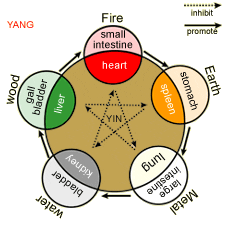Etiological or Causal Factors in TCM
TCM holds that there are both opposite and unitary relationships between the organs and the tissues, and between the human body and the natural environment. These things maintain a relative dynamic balance through a process in which contradiction alternately appears and disappears. When this dynamic balance is broken for whatever reason and cannot immediately be restored through self-regulation, certain diseases will occur.
| The five elements and their relationships with the body's organs |
| |
 |
The pathogenic influences that alter the state of relative balance in the body and lead to disease are called etiological or causal factors.
Modern Western medical science attempts to isolate purely physical factors as the cause of disease. Bacteria and viruses, chemical compounds, and other external factors are blamed for most illnesses. The Chinese, however, view many of these "causes" merely as symptoms of the disease; because a certain organ is weak and unable to resist outside invasion, it is therefore prone to attack by an outside agent. Killing the agent eliminates the immediate symptoms of the disease but does nothing to restore the original qi (vital energy) of the diseased organ and tissues. It is only a matter of time before it succumbs to another attack. TCM, however, attributes the cause of most diseases to external cosmological and internal emotional factors. These factors conform and act according to the principles of yin-yang and the five elements, which both stress balance and interconnectedness. The external cosmological causes of disease are called the "Six Evils" and are governed by the meteorological conditions of season and climate while the internal emotional factors are called the "Seven Emotions" which are affected by our emotional response to different situations. The Huang Ti Nei Ching (The Yellow Emperor's Medicine Classic) states: "The pathogenic evils either originate in yin or originate in yang; those coming from yang are related to wind, rain, cold, and summer heat; Those coming from yin are related to food and drink, living places, sexual life, and emotions such as joy and anger."
|